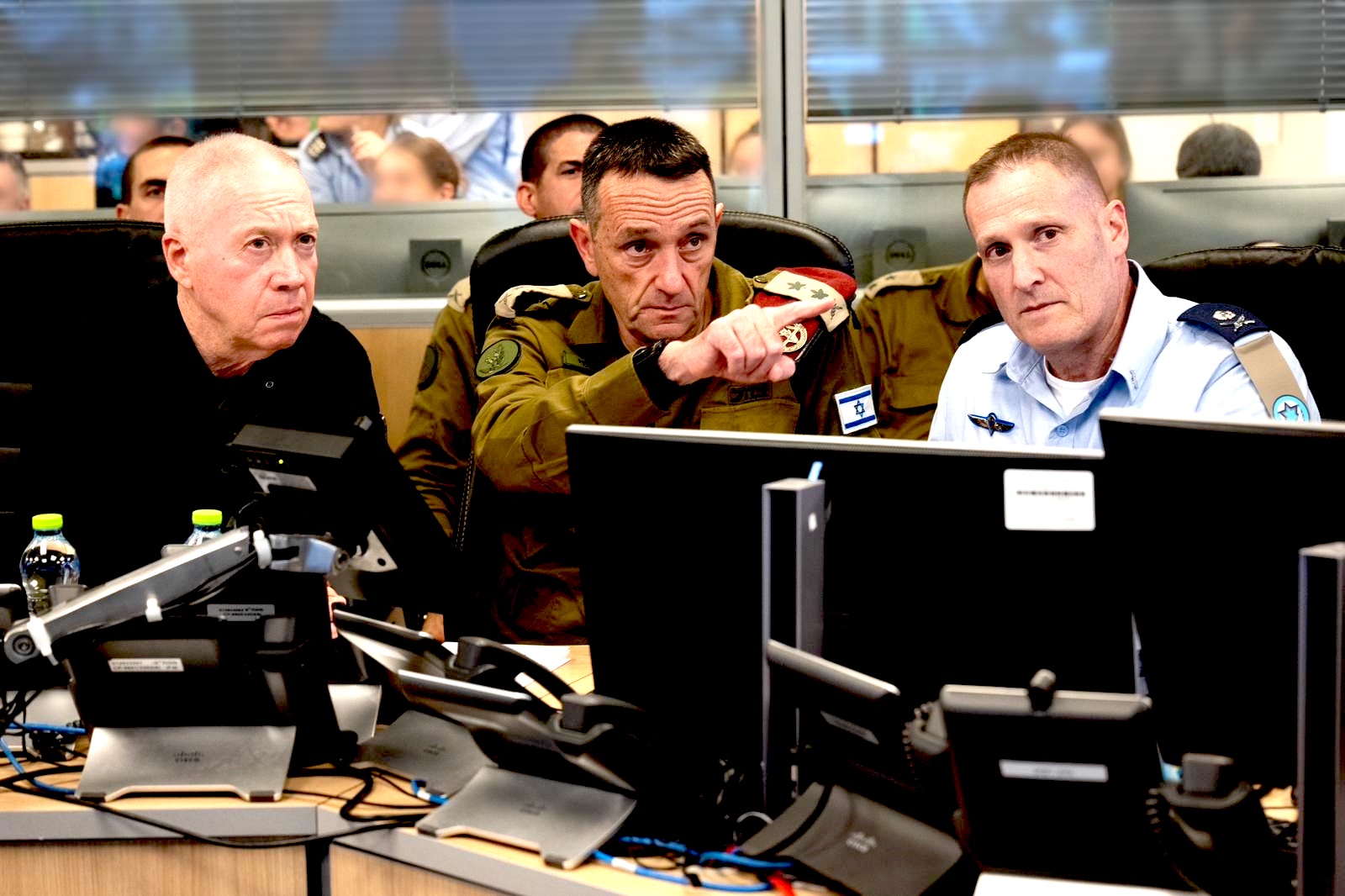Israel has announced a new phase of its war on Gaza while simultaneously conducting the most severe strikes so far on Beirut.

F-15I fighter jet used to attack targets in Lebanon on Sept. 27. (IDF Spokesperson’s Unit, Wikimedia Commons, CC BY-SA 3.0)
By Common Dreams Staff
Common Dreams
Israeli forces stepped up attacks in both the Gaza Strip and Lebanon overnight and into Sunday.
Israeli forces bombed a mosque and a school-turned-shelter in Gaza, killing 26 and injuring dozens more, according to the Palestinian Health Ministry; the Israeli military described the two sites as Hamas “command and control centers” but provided no evidence.
The Israeli military also on Sunday announced a “new phase” of the war in Gaza, issuing new evacuation orders that cover most of the northern part of the enclave, The New York Times reported. The military said it would send more soldiers and weapons to Gaza to “destroy terrorist infrastructures and undermine Hamas’ capabilities until all the war’s goals are achieved.”
Al Jazeera‘s Moath al-Kahlout reported that “the situation here in northern Gaza is deteriorating as the Israeli army intensifies its bombing.” He said that children, women, and journalists were among the victims.
“An entire family was killed by the Israeli army in the overnight attacks,” he added.
Meanwhile, Israel conducted the “most severe” airstrikes so far on Beirut, “pounding” the city overnight, according to The Guardian. The strikes were in southern Beirut and its suburban outskirts, which are seen as a Hezbollah stronghold and have been heavily targeted by Israeli forces for the past two weeks.
Israel intensifies its attacks on the Gaza Strip on the anniversary of October 7, while large explosions rocked southern Beirut as Israeli forces continued pounding the Lebanese capital.
? Follow our LIVE coverage: https://t.co/iFDjPFZQ4Y pic.twitter.com/5h5K60hyKQ
— Al Jazeera English (@AJEnglish) October 7, 2024
Al Jazeera journalist Ali Hashem, reporting from Beirut, described a “massive air strike” on Sunday near the city’s international airport —an area that Israel has been bombarding for days. He said that daytime strikes are particularly harrowing.
“During the nights there are warnings,” Hashem reported. “During the days there are no warnings.”
Hashem said that emergency services have been prevented from getting into the suburban area where many of the strikes are taking place.
The Lebanese Health Ministry said Sunday that 23 people were killed and 93 injured in Israeli strikes on Saturday.
The Israeli military continues to advance its ground incursion in southern Lebanon. On Sunday, it ordered people in 25 villages to evacuate immediately, “signaling it’s expanding its ground offensive,” Al Jazeera reported.
Refugee System Overwhelmed
Filippo Grandi, the United Nations’ high commissioner for refugees, visited Beirut on Sunday and called for a cease-fire — saying it was “desperately needed” — and international humanitarian aid.
Civilians in Lebanon “should not pay the price for the abysmal failure to find political solutions and end this vicious cycle of violence.”
The press statement issued at the end of my Lebanon visit and summarizing its conclusions ??https://t.co/trFyFTNSQy
— Filippo Grandi (@FilippoGrandi) October 6, 2024
About 1.2 million people have been displaced as Israeli forces have surged into southern Lebanon and undertaken a bombing campaign in multiple parts of the country, including in and around Beirut, leaving many people out in the street, with shelters mostly full as of Friday.
Nasser Yassen, Lebanon’s environment minister, announced the displacement figure last week on Wednesday, saying that about 160,000 had landed in shelters. Roughly half the displacements occurred over just a few days earlier in the week — both before and after Israel ordered people in dozens of villages in southern Lebanon to evacuate — according to Save the Children.
Most of the country’s 900 shelters are full, Rula Amin of the United Nations Office of the High Commissioner for Refugees said Friday at a press conference in Geneva, adding that some hotels and nightclubs were acting as makeshift shelters.
Mathieu Luciano of the U.N.’s International Organization for Migration said the situation was dire.
“Roads are jammed with traffic, people are sleeping in public parks, on the street, the beach,” he said, according to Reuters.
Bachir Ayoub, Oxfam’s Lebanon country director, said that the shelter system in Lebanon, whose entire population is roughly 5.5 million, couldn’t handle the high numbers of refugees.
“The shelter system is set to collapse if there is no peace on the horizon,” Ayoub said in a statement.
“There must be an end to this violence,” he added. “All parties must stop fighting. We need safe space to get people the aid they need.”
#Lebanon: People uprooted by Israeli airstrikes, including in central Beirut, describe being forced to flee “total destruction”, amid fresh reports of Hezbollah projectile attacks into Israelhttps://t.co/0mM7MowD0B
— UN News (@UN_News_Centre) October 3, 2024
Israel and Hezbollah, a Lebanese militia and political party, have traded airstrikes and rocket fire for the last year, and the conflict has seen a major escalation in the last two weeks.
Israel assassinated Hezbollah leader Hassan Nasrallah last week, reportedly using 2,000-pound “bunker buster” bombs manufactured in the U.S.; the attack flattened residential buildings and killed at least six others, in addition to Nasrallah.
This was one of series of airstrikes Israel has made on Beirut and its southern outskirts — a campaign that continued Friday, with the possible use of more “bunker buster” bombs.
The death toll over the last two weeks in Lebanon is over 2,000, according to the Lebanese Health Ministry.

Top Israeli military commanders Yoav Galant, Herzi Halevi and Tomer Barover on Sept. 28 as Israeli fighter jets attacked Beirut. (IDF Spokesperson’s Unit, Wikimedia Commons, CC BY-SA 3.0)
Israel launched a ground incursion in southern Lebanon on Tuesday last week, leading to close range fighting with Hezbollah and mass displacement of the residents there.
“People are coming to us traumatized,” said Gheith Bittar, executive director of SHiFT Social Innovation Hub, a Beirut-based group that partners with Oxfam. “Most of them have lost their houses and relatives. Some of them were scared because of the scale of bombardment as they were fleeing, and many others because of their fear of the unknown coming to a new city.”
Most Vulnerable Are Most at Risk
The most vulnerable members of Lebanese society are at the most risk, experts say. For example, many women from low-income countries are domestic workers in Lebanon and have been abandoned by their employers; some don’t seek shelter or aid for fear of being deported.
“They don’t have papers … and as a result, they are reluctant to seek humanitarian assistance because they fear that they may be arrested and they may be deported,” Luciano said.
The conflict has also led to the mass displacement of children, as Common Dreams reported last week.
More than 300,000 people in Lebanon have fled to Syria by Oct. 4, according to Al Jazeera. The group likely includes Syrians who had previously fled war in their home country.
However, the main route to Syria became far more difficult to take on Friday: Israel bombed it, leaving a huge crater.
Lebanon’s hospitals have been overwhelmed and at least 28 on-duty Lebanese medics were killed in just a 24-hour period this week, according to World Health Organization Director-General Tedros Adhanom Ghebreyesus.
This article is by Common Dreams staff.
Please Donate Today to CN’s Fall Fund Drive



The American officials know all about the unbelievable war crimes that are being committed with their consent. The whole world knows it. Killing defenseless people, mostly women and children by bombing them to Smithereen is nothing to be proud of. As a citizen, I am humiliated. How can the baby killer Bi*en sleep and show his face in public?
I can do one thing, I refuse to vote for war criminals. Harris and Trump have made it clear, if elected they will continue to support the slaughter of the Palestinian people women and children included. And that is only half of the ruling bipartisan establishment’s crimes.